Intro
Boost potassium intake with top 10 rich foods, including bananas, leafy greens, and sweet potatoes, to support healthy blood pressure, muscle function, and electrolyte balance.
Potassium is an essential mineral that plays a crucial role in maintaining various bodily functions, including heart health, blood pressure, and muscle function. It is also important for maintaining a healthy balance of fluids within the body. Despite its importance, many people do not consume enough potassium-rich foods in their diet. In this article, we will explore the top 10 potassium-rich foods that you should include in your diet to reap the numerous health benefits associated with this mineral.
A diet rich in potassium can help lower blood pressure, reduce the risk of heart disease, and promote healthy bone growth. Potassium also helps to regulate fluid balance in the body, which can reduce the risk of kidney stones and other kidney problems. Furthermore, potassium is important for maintaining healthy muscles and nerves, and it can help to reduce muscle cramps, spasms, and weakness. With so many benefits associated with potassium, it is essential to include potassium-rich foods in your diet.
The recommended daily intake of potassium varies based on age, sex, and other factors, but most adults need around 4,700 milligrams of potassium per day. Unfortunately, many people do not meet this recommendation, and potassium deficiency can lead to a range of health problems. By including the top 10 potassium-rich foods in your diet, you can help to ensure that you are getting enough potassium to maintain optimal health.
Introduction to Potassium Rich Foods
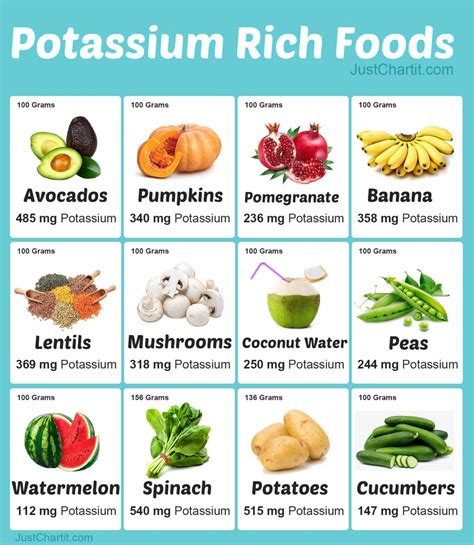
Benefits of Potassium Rich Foods
The benefits of potassium-rich foods are numerous and well-documented. Some of the key benefits include: * Lower blood pressure: Potassium helps to balance the effects of sodium in the body, which can help to lower blood pressure and reduce the risk of heart disease. * Healthy bones: Potassium helps to regulate the amount of calcium in the body, which is essential for maintaining healthy bones. * Reduced risk of kidney stones: Potassium helps to regulate fluid balance in the body, which can reduce the risk of kidney stones and other kidney problems. * Healthy muscles and nerves: Potassium is essential for maintaining healthy muscles and nerves, and it can help to reduce muscle cramps, spasms, and weakness.Top 10 Potassium Rich Foods
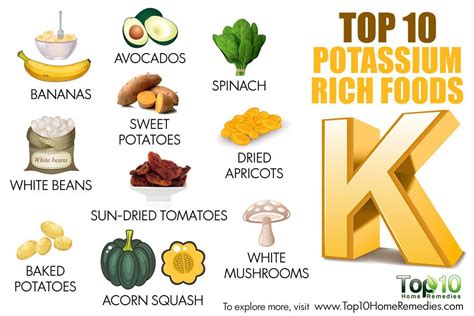
How to Incorporate Potassium Rich Foods into Your Diet
Incorporating potassium-rich foods into your diet can be easy and delicious. Here are some tips: * Add bananas to your oatmeal or yogurt for a potassium-rich breakfast. * Use leafy greens such as spinach and kale in salads, smoothies, and sautéed dishes. * Bake or roast sweet potatoes as a side dish. * Add avocados to salads, sandwiches, and smoothies. * Grill or bake salmon as a main course. * Add mushrooms to soups, stews, and stir-fries. * Pickle beets as a side dish or add them to salads. * Use yogurt as a base for smoothies or as a topping for oatmeal or fruit. * Add squash to soups, stews, and roasted vegetable dishes. * Use legumes in soups, stews, and salads.Potassium Rich Foods and Heart Health
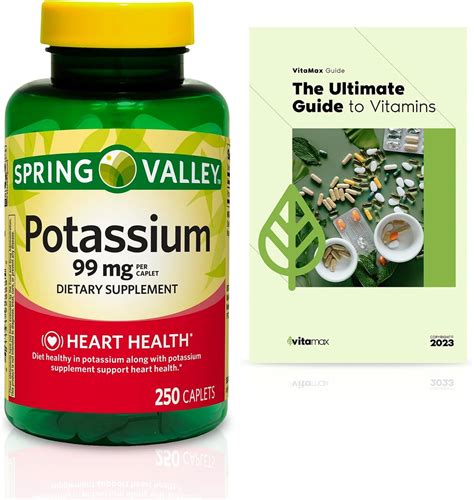
Potassium Rich Foods and Bone Health
Potassium-rich foods can also play a crucial role in maintaining bone health. Potassium helps to regulate the amount of calcium in the body, which is essential for maintaining healthy bones. Potassium-rich foods such as leafy greens, sweet potatoes, and avocados are also rich in other nutrients such as vitamin K and magnesium, which are essential for maintaining bone health. Additionally, potassium can help to reduce the risk of osteoporosis and fractures, particularly in older adults.Potassium Deficiency and Its Effects
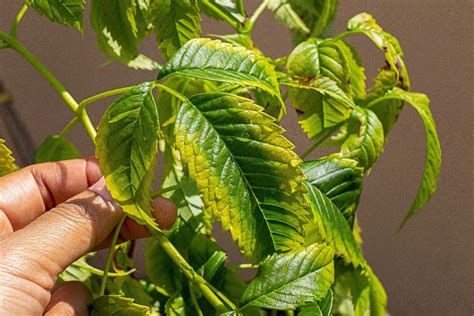
If left untreated, potassium deficiency can lead to more serious health problems, including:
- Heart failure
- Kidney damage
- Respiratory failure
- Muscle paralysis
Treatment and Prevention of Potassium Deficiency
Treatment and prevention of potassium deficiency typically involve increasing potassium intake through diet and supplements. Here are some tips: * Eat potassium-rich foods such as bananas, leafy greens, and sweet potatoes. * Take potassium supplements as directed by a healthcare provider. * Avoid excessive intake of sodium, which can increase potassium excretion. * Stay hydrated by drinking plenty of water. * Limit intake of processed and packaged foods, which are often low in potassium.Conclusion and Final Thoughts
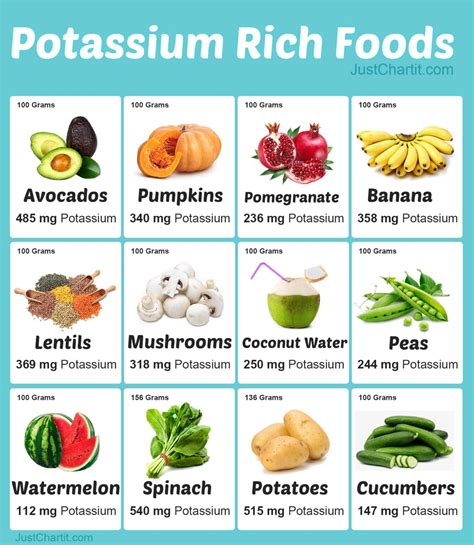
We hope this article has provided you with valuable information about the importance of potassium-rich foods. If you have any questions or comments, please feel free to share them below. Additionally, if you found this article helpful, please share it with your friends and family on social media.
What are the symptoms of potassium deficiency?
+The symptoms of potassium deficiency include muscle weakness and cramps, fatigue and weakness, heart palpitations and arrhythmias, constipation and abdominal cramps, and mood changes and depression.
How can I increase my potassium intake?
+You can increase your potassium intake by eating potassium-rich foods such as bananas, leafy greens, and sweet potatoes, taking potassium supplements as directed by a healthcare provider, and limiting your intake of processed and packaged foods.
What are the benefits of potassium-rich foods?
+The benefits of potassium-rich foods include lower blood pressure, healthy bones, reduced risk of kidney stones, and healthy muscles and nerves.
Can I get enough potassium from supplements alone?
+No, it is recommended to get potassium from a combination of food and supplements. While supplements can help to increase potassium intake, they should not be relied upon as the sole source of potassium.
How much potassium do I need per day?
+The recommended daily intake of potassium varies based on age, sex, and other factors, but most adults need around 4,700 milligrams of potassium per day.
